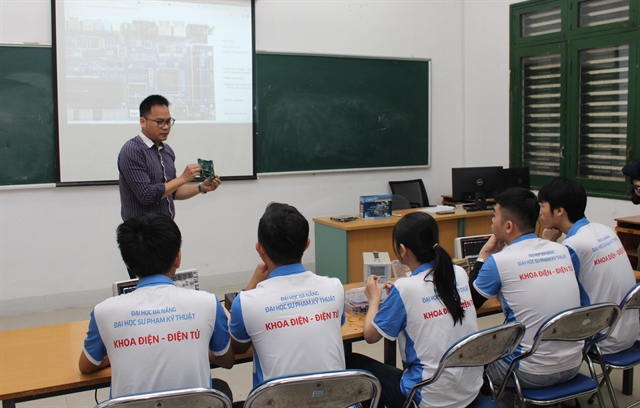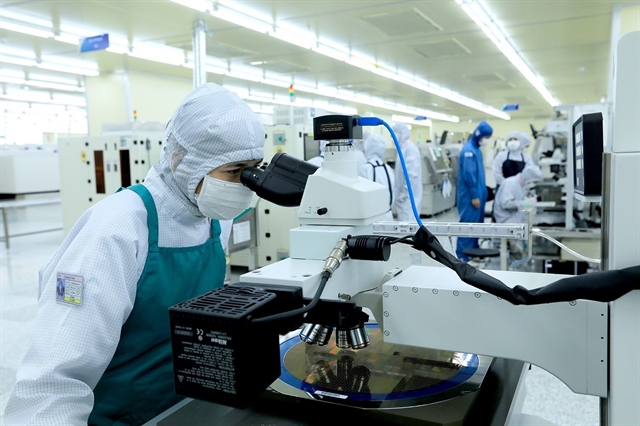 Society
Society


|
| Students at the University of Technology and Education in Đà Nẵng during a practice session on semiconductor design. — VNA/VNS Photo Văn Dũng |
ĐÀ NẴNG — As the semiconductor industry becomes a focus of development, higher education institutions in Đà Nẵng have accelerated their investments in training programmes and infrastructure to meet the sector’s human resources needs.
The Vietnam-Korea University of Information and Communication Technology (VKU - under the University of Đà Nẵng) has put investments into a semiconductor integrated circuit (IC) lab and a lab for experiments and research of new technologies, said the university’s dean Huỳnh Công Pháp.
"Human resources development is a focus for the school, in addition to infrastructure investment," he said.
VKU counts more than 30 lecturers in microelectronics, microcircuits, semiconductors and computer engineering among its official staff.
The school also signed a training agreement for students majoring in semiconductor design with South Korean experts in the field, as well as the Information Technology Institute (under the Vietnam National University-Hanoi) and various businesses.
Meanwhile, the University of Technology and Education (under the University of Đà Nẵng) plans to accept its first cohort of semiconductor engineering students this year, with around 50 enrolments expected.
According to Principal Dr Phan Cao Thọ the school is also developing a Master’s programme in Internet of Things (IoT) and semiconductor circuits.
As part of the preparation process, the University of Technology and Education is working on an official development assistance (ODA) investment project that will establish an IoT and semiconductor lab equipped with server and hardware systems and software for semiconductor design training, as well as IC testers.
The school’s teaching staff for electronic and computer engineering include two associate professors and eight PhD graduates, alongside other lecturers from the University of Đà Nẵng.
Cooperation partnerships are also underway to invite experts from local and international corporations and businesses for student training and internships.

|
| A worker at a production line of Hana Micron Vina semiconductor plant in Bắc Giang Province. — VNA/VNS Photo Tuấn Anh |
Thọ expects IC design to witness high demand for human resources in the near future.
Students pursuing this major will also have scholarship opportunities from companies, in addition to the school’s support and preferential policies that aim to motivate them in their studies, and to respond to social and business demands.
Keeping pace with technology advancements, the University of Science and Technology in Đà Nẵng recently inaugurated its IC design practice room, which is fully equipped with a computer system and an industrial-grade IC design toolkit from Cadence, a multinational company specialising in electronic systems design.
The room is used for short courses on very large-scale integration (VLSI) technology and for students in majors related to IC design.
Devices and software for the practice room were sponsored by Fujikin Đà Nẵng, FPT Software, Renesas, Cadence and Unitec.
These businesses also confirmed their commitment to accompany the university in human resources education for microelectronics and IC design, as well as supporting short-term training courses.
At the end of January this year, Đà Nẵng announced it would establish the Đà Nẵng Semiconductor and Artificial Intelligence Centre for Research and Training (DSAC).
According to Đà Nẵng People’s Committee chairman Lê Trung Chính, the centre will serve as the advisor to the city’s leadership in building and executing the semiconductor and microchip development projects in the locality.
The centre is also expected to be the focal point for cooperation opportunities between Đà Nẵng and local and international partners in the field of integrated circuits and artificial intelligence. — VNS




